Kathleen Jones's Blog, page 72
February 19, 2012
Thanks for the comments
Thank you to everyone who sent me comments on the text - the general feeling was positive and I had several helpful suggestions. I will now be starting on the Big Edit - working my way through the manuscript trying to hone it to perfection. In a couple of weeks I'm going to post a list of editing
musts
put together by a friend and shared many times with students and other writers - a life saver!
I'm doing a lot of travelling this week, but there will be a Tuesday Poem and then novelist Wendy Robertson is doing a guest blog on the subject of Writers Retreats and the wonderful Irish novelist John McGahern.
I should be back in Italy by Friday, snow, wind and rain permitting! I hope you're all having a good week wherever you are and whatever you're doing.
I'm doing a lot of travelling this week, but there will be a Tuesday Poem and then novelist Wendy Robertson is doing a guest blog on the subject of Writers Retreats and the wonderful Irish novelist John McGahern.
I should be back in Italy by Friday, snow, wind and rain permitting! I hope you're all having a good week wherever you are and whatever you're doing.
Published on February 19, 2012 14:10
February 15, 2012
The Centauress - New Work In Progress.
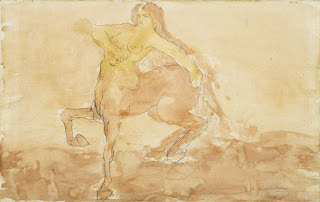 Rodin: The Centauress
Rodin: The CentauressThis is the really scary bit - I've just finished the first draft of a fictional project I've been working on for a while. A difficult story with a complicated plot, set in Istria - a traditionally Italian area of Croatia. The two central figures are an elderly painter, Xenobia, who has led a controversial life, and her biographer, Alex, recently bereaved and trying to find the narrative of her own life again. I have no idea whether it will interest anyone other than myself. I've been so immersed in it, I haven't been able to stop to think about what anyone else might think! So, before I spend precious weeks re-writing and editing, I need to know if a reader would be interested enough to read on after the opening pages. These first pages are critical in any book - if you're not hooked by page 3 you usually give up. That's why I'm pasting them below and would really appreciate honest, straight-forward comments from my lovely blog-readers. Would you want to read on? Or would you not? You don't have to be tactful!
The Centauress (working title)
Chapter One
Trieste, 2005
In an unfamiliar hotel room in Trieste, at the junction of three worlds - Italy, Northern Europe and the East - Alessandra Forbes is sitting up in bed, propped by a pile of baroque cushions. Her dark hair - the legacy of an Italian grandfather - swings shoulder length against the straps of her nightdress, and her blue - very English - eyes are focused on the page in front of her. She is writing in her journal, trying to put her feelings for Xenia into words that might be quoted in a press release. 'There are certain people who have the power to change your life for ever,' she writes, 'even though you only meet them once or twice. Xenobia de Braganza was one of those people.' But the phrases seem weak and inadequate to convey how dramatically Xenia had changed Alex herself from a self-pitying zombie into a human being once more capable of feeling joy and love.
It's nearly two years now since Xenia died, but she is still as strong and turbulent in Alex's memory as she had been when she was alive, and much more so here in Xenia's birthplace. This house had, before the economic collapses of the nineteen twenties, belonged to Xenia's father. Since then it's been an office complex and an apartment block and is currently a boutique hotel owned by a Swiss businesswoman. Alex has tried to make sense of the rooms, to discover any traces of Xenia's childhood geography, but after a world war, so many alterations, and the recent ravages of a German architect, it's transformation has been too ruthless.
Xenia is also on Alex's mind because a week ago on a visit to London to talk to her publisher about a paperback edition of the biography, she had bumped into Xenia's former companion, Freddi Baker-Thompson, in the Charing Cross Road. It was the first time Alex had seen her since the funeral and Freddi looked strained, fragile, older. Her blonde hair had streaks of grey. She paused in front of Alex for a second on the pavement, opened her mouth as if to respond to Alex's smiling hello, but then abruptly turned and darted away into the traffic without looking, as if she'd seen some monster she had to flee from. Mutual friends have told Alex that Freddi perfectly understands that she had to tell the truth, to honour her promise to Xenia, but she hates Alex for it just the same. Alex understands Freddi's unhappiness. Two years ago Alex had been in the same place - lonely and grieving. It doesn't seem right that she should now be in bliss while Freddi suffers.
In Istria at the Kaštela, after Xenia's death, Freddi had come to Alex's room and tried to make her promise to keep her own name out of Xenia's biography.
'You have to, Alessandra,' she had said. It was significant that Freddi had used her full name. Freddi's eyes were red with crying. 'I don't want to be mentioned.'
Alex had been appalled. 'How can I do that? You've been such an important part of her life. I have to mention you even if it's just to say, "Freddi Baker-Thompson, her companion for ten, fifteen years" - however long you've been together.'
'Fourteen. Fourteen wonderful, difficult years. The heaven and hell of living with Xenia. There were always two ways of looking at things with her.'
'But that's what I need from you. No one else can tell me how that feels.'
'Absolutely not! Do you know what people might say?'
That was eighteen months ago. Since then Alex has been back to the Kaštela only once - an impulsive mistake she had made yesterday, when driving up from Zagreb to Trieste. Mutual acquaintances had warned her, but Alex had wanted to see for herself, to make one last connection with Xenia. It had been a distressing experience. The avenue of lemon trees had been cut down and the ancient fortress had been altered beyond recognition. A large notice in red and white said 'Proprieta Privata' and then underneath, in Croat, 'Privatno Vlasnistvo'. Alex thought grimly that Xenia would have approved the double languages if not the sentiment. True to Xenia's communist principles Alex had ignored the notice but was accosted before she'd even reached the terrace by a security guard with a rifle slung over his shoulder who swore at her in Croat with a strong Russian accent. He stood at the entrance, a dark threatening figure in black and green fatigues, to watch her depart. Alex knew then that she would never go back there again.
In the night Alex dreamt that she was listening to Xenia's voice on the tapes she'd made before Xenia died, on that first, nervous visit to Kaštela Visoko. They had been sitting in the shade of the loggia on an airless autumn afternoon with a bottle of wine open on the table. It was one of her bad days. Alex had asked Xenia about her childhood, her family, her home, and found her evasive and uncooperative. Xenia had retreated into some small internal space and closed the door. Even encouraged by Freddi, she could not, or would not, answer Alex's questions, turning her face obstinately away, talking about the olive harvest, the problem of finding girls to work for the tourist season, Concetta's marital difficulties. Anything but the one subject Alex wanted her to talk about - herself. Then, almost out of desperation, Alex had asked, 'What's the first thing you remember?'
For a moment Xenia had picked at the hem of her linen jacket with her fingers in an angry kind of way, and Alex thought she was going to ignore this question as she'd ignored all the others. But then her face changed; her eyes began to flicker with images that only she could see and her mouth relaxed, beginning to shape the words to fit. It was like turning the key to a very ancient lock. Alex could almost hear the stiff tumblers clicking over, one by one, until the door unlatched and you could walk through. Xenia's voice on the tape was very deep, almost masculine, but also musical, each syllable separately pitched and accorded its own variations of tone and colour.
When she spoke it was as if she was dreaming aloud. When Alex closed her eyes it was as if she was inside Xenia's memory.
When I wake up in the dark the first thing I see is the mirror. This one not very special, just a long thin glass on the wardrobe door beside my bed. As soon as I open my eyes I can see my hunched-up body under the bedclothes, then the enameled bedstead. You have seen those old Italian beds? Painted with flowers and scrolls of gold leaf - very beautiful. On the other side of the room I can see the thick brocade drapes across the windows, flared with the shadows of the night-light my governess has left on the bedside table. Even then, I was fascinated by the play of the light, how it shaped and sculpted and told different stories. There is a wash stand against the wall and a little chair beside it. In the mirror I can see the line of light that marks the edge of the door. It opens into a corridor and at the end of the corridor is the room where my mother is entertaining friends. Tap, tap, tap. Their heels echo on the marble floor. People are coming in and out of the room and as the door opens and closes, there are little pulses of music and laughter. I cannot bear to be alone here in the darkness. Basta! I say to myself. I cannot stay here.
It is a great distance from my bed to the floor. Slowly I slide towards it until I can just touch it with the tips of my big toes. My mother used to put me in a long cotton nightdress and it has coiled itself round my armpits, stringing me up like a criminal. I tug myself free and lower myself onto the marble floor. How cold it is! How well I remember that feeling on the soles of my feet.
Xenia had paused here, running her tongue over her dry lips. Alex had thought she was going to stop and opened her mouth to prompt her, but Xenia had already begun again, lapsing into Italian - speaking fluently and fast, her beautiful eyes flashing. Alex had to struggle to keep up with the flow of language.
In the corridor the lights were flickering in their bronze sconces. In my mother's day there were Venetian mirrors in ornate frames on each side. These were fascinating for a child. In daylight they showed a series of paintings. Nature Morte, I suppose I would call them now. But I had already begun to suspect that behind their surfaces lurked other worlds, with different perspectives. It was as if the glass was a sheet of water, changing whatever you could see under it. I used to stare into them for hours. Reflections of ordinary things - a lamp or a vase of flowers - everything became magnified into something wonderful and strange. Even my own image came back to me altered. That was when I first knew that I was a twin. In the mirror was my other self - a changeling child - my face angelic and obedient - hair curled and be-ribboned by my nurse - clothes immaculate - only my eyes were mine - dark, fierce eyes - staring at me out of the glass.
But at night, these mirrors became a terrible ordeal, showing terrible things - distorted fragments - mutilated faces - images of hell. I knew I must avoid them - or they would steal my soul as I passed.
And then I am outside my mother's door and I think - how am I to open it? I am too small to reach the handle and this makes me angry. I lean against it in a temper and push. Like magic the heavy door swings open and I am there in all the warmth and the light. Eccomi! My mother is leaning against the piano with her head thrown back. Signor Puccini is sitting on the piano stool with his hands on the keys and another man I do not know is playing the violin.
'Ah! Bambina!' Someone calls and the music stops. They all turn to look at me.
My mother's head swivels towards me and her face is cross. 'I can't get her to stay in her room,' she says angrily. 'What am I to do?'
'So sweet!' one of the ladies leans forward. 'What's your name?'
'Xenobia,' I tell her.
'What a strange name,' she says.
It is what everyone says. The cook says it is like an illness, or a foreign plant. But of course it was my grandmother's name they had cursed me with. My father's mother.
'They call me Xenia,' I whisper. She offers me a sweet. And then I am allowed to sit on her lap and listen to the music. I fall asleep with my face pressed against the hard sequins of this lady's dress. The dangling glass beads of her cap glitter above me in the light and as they glance against each other when she moves her head they sound like someone laughing.
And then suddenly Xenia stopped. She looked dazed and disorientated. Alex could hear her voice on the tape asking 'Who is this woman? What is she doing here?'
'She's come to write your life into a book,' Freddi said in very literal, awkward Italian, as if explaining to a child. 'She's the biographer.'
What did it mean to Xenia at that moment: the biographer? A collector of gossip, of memories, an assortment of facts, tossed together in a matrix of words. Alex was being paid to cast her life into stone.
After a pause Alex could hear her own voice on the tape again, soothing, non-committal, hoping to restart the flow of recollection. 'Did you have a good relationship with your mother?'
'I was a difficult child,' Xenia replied, almost sulkily. Alex remembered that she had shrugged her shoulders and raised her hands at this point. 'My mother could do nothing with me.' Then she had looked at Alex with those penetrating, disconcerting eyes. 'Mothers and daughters. It is the most difficult relationship, is it not?'
~~~~~~~~~~~~~~~~~~~~~~~~~~~~~~~~~~~~~
That's Chapter One - all comments gratefully received. Now I'm off to England for a brief visit to look after my small grand-daughter Isabella for a few days while my daughter is at a conference. I'm really looking forward to spending time with her and hoping the English weather will be better than the Italian - which is still below zero. Some parts of Italy have had 3 metres of snow, as far south as Sicily. The worst winter in generations - that's what they're calling it.
Published on February 15, 2012 05:34
February 13, 2012
Carnival in Viareggio
It's carnival time again in Viareggio, which is one of the best carnivals in Europe - famous for its gigantic floats, some of which are designed by leading artists. This one is 'Anger', identified by its maker as the most problematic human emotion.
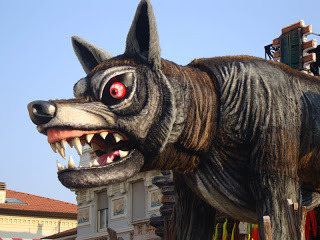
It's hard to convey the sheer joy of the carnival; every kind of music - from Puccini to Abba - bouncing off the walls, whole families in fancy dress,
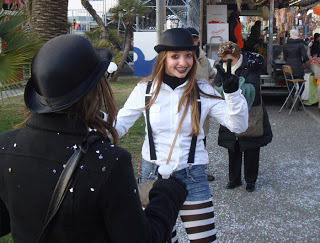
people dancing in the street, ankle deep in confetti and streamers.
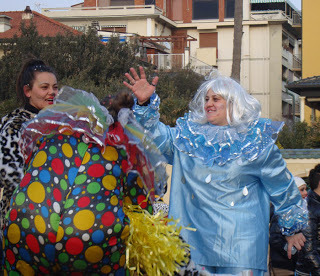
And the sheer size of the floats - towering many stories above the buildings, and taking up the whole width of the road.
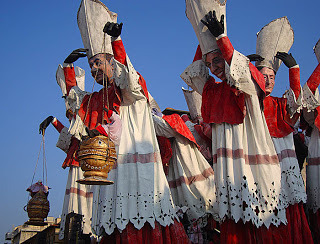
In between the floats, small parades, just as striking.
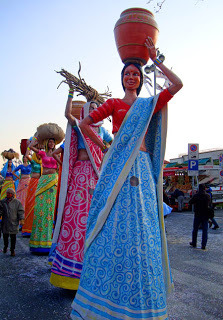
There's always a satirical theme - this year European politics took another beating. We had Sarkozy as Napoleon on a horse
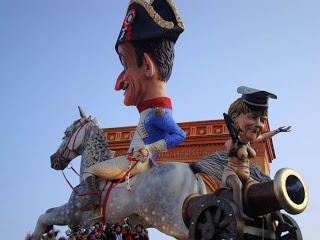
with Angela Merkel riding shot gun dressed (or undressed) as a dominatrix.
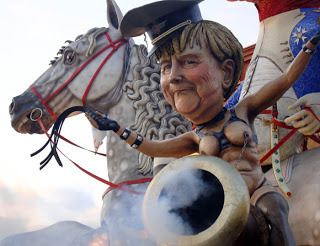
And it was hard not to connect this float with Captain Schettino of Concordia fame, steering the ship of Italy onto the rocks, a vulture on his shoulder, taking the whole of Europe with him,
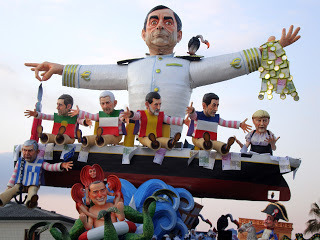
though Berlusconi is in a life belt with three nubile mermaids (well, he would be wouldn't he?).
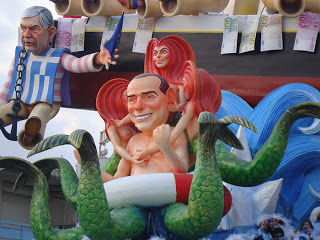
One of the most impressive floats was a visualisation of last year's Japanese Tsunami, with the motto 'On the surface we contemplate Flowers - underneath an Inferno'. Video Link here.
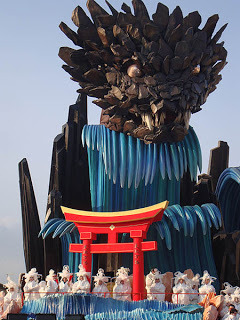
Surrounded by Geishas with umbrellas and fans dancing out an impeccable choreography, it was really moving.
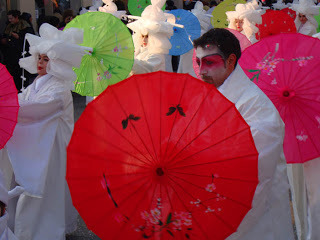
I had a fabulous time and the weather stayed fine, temperatures around zero, but no wind or snow.
If you want to know what it sounds and feels like to be there - I found recommend this little video on You Tube filmed at last weekend's parade. The final parade will be next week, but by then I'll be in England - unexpectedly. Meanwhile, I've got to go and get the confetti and silly string out of my clothes!


It's hard to convey the sheer joy of the carnival; every kind of music - from Puccini to Abba - bouncing off the walls, whole families in fancy dress,

people dancing in the street, ankle deep in confetti and streamers.

And the sheer size of the floats - towering many stories above the buildings, and taking up the whole width of the road.

In between the floats, small parades, just as striking.

There's always a satirical theme - this year European politics took another beating. We had Sarkozy as Napoleon on a horse

with Angela Merkel riding shot gun dressed (or undressed) as a dominatrix.

And it was hard not to connect this float with Captain Schettino of Concordia fame, steering the ship of Italy onto the rocks, a vulture on his shoulder, taking the whole of Europe with him,

though Berlusconi is in a life belt with three nubile mermaids (well, he would be wouldn't he?).

One of the most impressive floats was a visualisation of last year's Japanese Tsunami, with the motto 'On the surface we contemplate Flowers - underneath an Inferno'. Video Link here.

Surrounded by Geishas with umbrellas and fans dancing out an impeccable choreography, it was really moving.

I had a fabulous time and the weather stayed fine, temperatures around zero, but no wind or snow.
If you want to know what it sounds and feels like to be there - I found recommend this little video on You Tube filmed at last weekend's parade. The final parade will be next week, but by then I'll be in England - unexpectedly. Meanwhile, I've got to go and get the confetti and silly string out of my clothes!
Published on February 13, 2012 02:53
February 9, 2012
The Pity of War - Romano Cagnoni
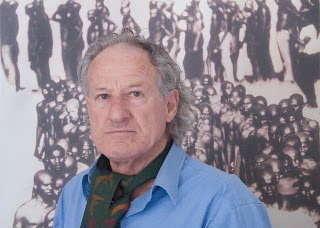
Watching the heavily edited and filtered images coming out of Syria at the moment, proved to be a sobering context for Romano Cagnoni's latest exhibition. I've blogged about him before, when he had a small show in London, but this one is a big retrospective at the Palazzo Mediceo (the wonderful former home of the Medici family) in Seravezza. Romano is probably Italy's greatest living photographer and has made his reputation in war zones. He specialised in going in under the radar and reaching the places the authorities didn't want anyone to see.
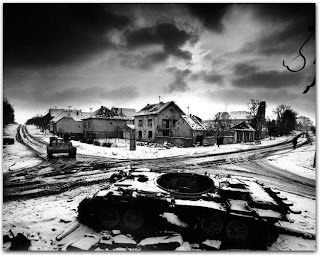
The result is a narrative record of the terrible things that human beings do to each other. His photographs of Biafra are brilliant, but too horrific for me to reproduce here. He was also in Vietnam and in Croatia and Bosnia when Yugoslavia imploded. His pictures of what was left of Vukovar are particularly shocking.
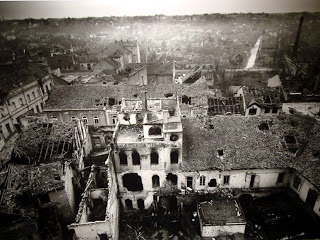
More recently he's been to Groszny to photograph the conflict in the Chechen Republic.
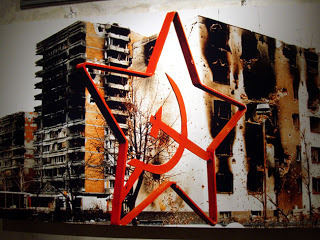
One of the most interesting things about the exhibition is Romano's commentary on what is, effectively, a record of his life. Under a stunning black and white photo of a room full of men all sitting at separate tables in a bar, he writes that 'men's loneliness is linked with fear. Men fear one another.' And fear leads to war.
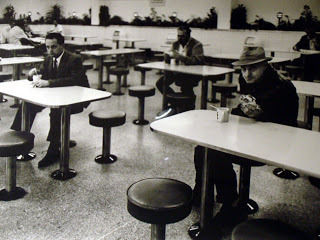
And he sees the Chechen guerilla fighters as modern-day Greek heroes like Ulysses.
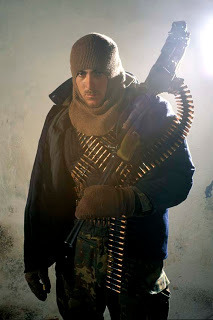
With his recent work he's been experimenting with a large format camera and huge colour prints that use landscape, colour and texture with the dexterity of a painter. I'm afraid my poor little sony pot-shots can't even begin to convey the beauty of these photographs, or the size - the canvases above and below were both life-size.
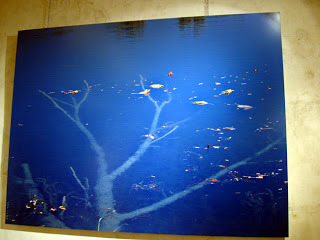
As a writer, struggling with words, I do envy the amount of narrative that can be conveyed (without any translation) in a single image. This is work of the highest possible calibre. The exhibition lasts until 9th April.
Published on February 09, 2012 08:10
February 6, 2012
Tuesday Poem: Martin Figura's 'Whistle'
This poem comes from the compelling narrative sequence of poems 'Whistle' by Martin Figura, published by
Arrowhead Poetry
. For a full review of the collection and the context of the poem
please click here.
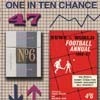
Strange Boy
We believe there is a one in ten chance
the boy will inherit it from his father
The boy is top in maths
He is near the bottom of the class in everything else
He writes wild imaginative essays with little regard
for spelling or grammar
He cries easily
The boy's house is Belmont 47 (a prime number)
We know he steals, but are letting it go for now
We also know he smokes
He pulls a face when he concentrates
The other boys have noticed this
The boy is left here during half-term breaks
He occupies himself with dice games of cricket and football
that can take days to complete
They are too complex for anyone else to participate in
The boy maintains a number of statistical graphs
He is a good goalkeeper
He has made some friends through football
He has invented an elaborate past
He carries a 1966-67 News of the World Football Year book at all times
Father William lets him complete his pools coupon
He has had some small successes
Copyright Martin Figura
reproduced with permission.
www.martinfigura.co.uk
Martin Figura was born in Liverpool in 1956 and works part-time at the Writers' Centre, Norwich and as a photographer. He is a member of the poetry ensemble The Joy of 6. A spoken word version of his new collection Whistle (Arrowhead Press, 2010) is being toured by Apples and Snakes. He is Chair of the Café Writers Live Literature organisation in Norwich.
For a review of the whole collection please visit http://www.kathleenjonesdiary.blogspot.com
For more stunning Tuesday Poems please visit the website at http://www.tuesdaypoem.blogspot.com


Strange Boy
We believe there is a one in ten chance
the boy will inherit it from his father
The boy is top in maths
He is near the bottom of the class in everything else
He writes wild imaginative essays with little regard
for spelling or grammar
He cries easily
The boy's house is Belmont 47 (a prime number)
We know he steals, but are letting it go for now
We also know he smokes
He pulls a face when he concentrates
The other boys have noticed this
The boy is left here during half-term breaks
He occupies himself with dice games of cricket and football
that can take days to complete
They are too complex for anyone else to participate in
The boy maintains a number of statistical graphs
He is a good goalkeeper
He has made some friends through football
He has invented an elaborate past
He carries a 1966-67 News of the World Football Year book at all times
Father William lets him complete his pools coupon
He has had some small successes
Copyright Martin Figura
reproduced with permission.
www.martinfigura.co.uk
Martin Figura was born in Liverpool in 1956 and works part-time at the Writers' Centre, Norwich and as a photographer. He is a member of the poetry ensemble The Joy of 6. A spoken word version of his new collection Whistle (Arrowhead Press, 2010) is being toured by Apples and Snakes. He is Chair of the Café Writers Live Literature organisation in Norwich.
For a review of the whole collection please visit http://www.kathleenjonesdiary.blogspot.com
For more stunning Tuesday Poems please visit the website at http://www.tuesdaypoem.blogspot.com
Published on February 06, 2012 13:03
February 5, 2012
When Women Writers were Mad, Bad and definitely Dangerous.
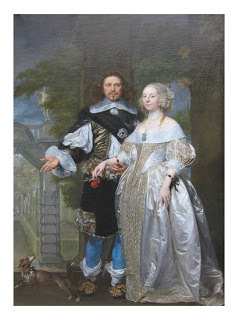 The seventeenth century Margaret Cavendish - one of the very first women writers to publish her own work - was known as the Mad Duchess. King Charles II is alleged to have described her as 'an entire Raree-Show in her own person - a universal masquerade - indeed a sort of private Bedlam-hospital, her whole ideas being like so many patients crazed upon the subjects of love and literature'.
The seventeenth century Margaret Cavendish - one of the very first women writers to publish her own work - was known as the Mad Duchess. King Charles II is alleged to have described her as 'an entire Raree-Show in her own person - a universal masquerade - indeed a sort of private Bedlam-hospital, her whole ideas being like so many patients crazed upon the subjects of love and literature'. Although she lived like a nun, scribbling away in her study, so that even her ladies in waiting hardly saw her, she was still nicknamed 'the Whore of Welbeck'.
Margaret was born in Colchester in 1623, the daughter of a wealthy gentleman. She had a very eventful life - living through the English civil war. Her family home was razed to the ground by Cromwell's troops, her mother imprisoned, two of her brothers killed, and she escaped to France to join the court of Queen Henrietta in Paris, where she met her husband. She was only a gentleman's daughter, Newcastle was a friend of the king and one of the greatest landowners in England, so there was a lot of opposition to their marriage. It was a genuine love match - they lived in relative poverty and exile for 20 years before they were able to return to England. Newcastle (a cavalier author himself) encouraged his wife to write and paid for publication of her work.
The problem was that women in the 17th century were supposed to know their place, which was in the home, meekly, modestly ruled by their husbands - a state of subservience which had been ordained by God and could not be argued with. But women did argue - and Margaret Cavendish was one of the most vocal.
'Men are happy,' she wrote, 'and we women are miserable, for they possess all the ease, rest, pleasure, wealth, power and fame, whereas women are restless with labour, easeless with pain, melancholy for want of pleasure, helpless for want of power and die in oblivion for want of fame; nevertheless men are so unconscionable and cruel against us as they endeavour to bar us of all sorts of kinds of liberty, as not to suffer us freely to associate amongst our own sex, but would fain bury us in their houses or beds as in a grave; the truth is we live like bats or owls, labour like beasts, and die like worms.'
The problem, Margaret identified, was lack of education. Most women received their instruction from their uneducated mothers - 'one fool breeding up another' as Margaret put it. The result was a spiral of ignorance. There was also a lack of role models. 'What woman was ever so strong as Sampson, or so swift as Hazael? What woman was ever so wise as Solomon or Aristotle, so politic as Achitophel, so demonstrative as Euclid, so inventive as Archimedes?' If there had ever been such women they had left no traces to encourage their descendants.
Margaret became so notorious that when she visited London, Samuel Pepys was one of those who crammed the street to see her carriage pass by, with a crowd of small boys running after it trying to get a glimpse of so infamous a woman.
Why did she risk all this? She confessed to an addiction to words, and being childless, she wanted to avoid the oblivion most women sank into when they died. In a preface to her autobiography she penned a wistful apology.
'Some censuring Readers will scornfully say, why hath this lady writ her own life? Since none cares to know whose daughter she was, or whose wife she is, or how she was bred, or what fortunes she had, or how she lived, or what humour or disposition she was of? I answer that it is true, that 'tis to no purpose to the Readers, but it is to the Authoress, because I write it for my own sake, not theirs, to tell the truth, lest after ages should mistake in not knowing I was daughter to one Master Lucas of St John's, second wife to the Duke of Newcastle.'
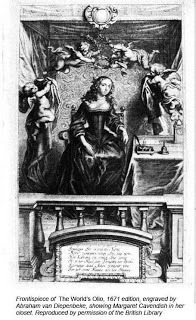
Margaret Cavendish 'A Glorious Fame' was my first published book, scribbled in the university library while my children were at school and when I should have been studying for my own degree. It's been out of print for a few years now and I am very happy to put it up on Kindle with a new, previously unknown portrait of the Duchess and her husband I found in a German art gallery. Margaret deserves every little bit of fame she can get - we owe our own freedom to write, and publish what we write, to women like her, who risked their sanity and reputations to get into print. However bad the current publishing industry, it isn't as bad as that!
Margaret Cavendish: A Glorious Fame is available on Kindle at the introductory price of £1.54
Published on February 05, 2012 01:25
February 2, 2012
Winter comes to Capezzano
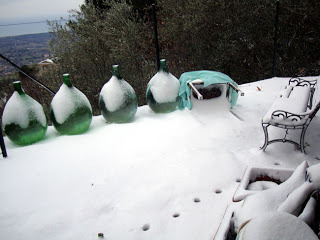
Yesterday we had a blizzard - winds strong enough to blow a steel barbecue across the terrace and relocate the TV aerial, and a few inches of snow frothing over the olive trees like soapsuds. We're on the edge of a Siberian front that's bringing unusually cold weather across europe. It's still snowing on and off and more snow and freezing temperatures forecast for the weekend. Winter weather like this doesn't usually last for longer than a couple of weeks, though further north it's more severe.
We're cat and dog sitting at Peralta for ten days or so at the moment - one frisky little hunting dog called Ellie who's obsessed with chasing objects, an elderly, deaf, arthritic, but very aristocratic Spinoni called Frank (short for Frankenstein!), Vaniglia- a shy burmese cross cat, and a big, affectionate black and white male called Pino. Tonight they're all in beside a roaring fire and we've opened a bottle of wine to keep out the weather.
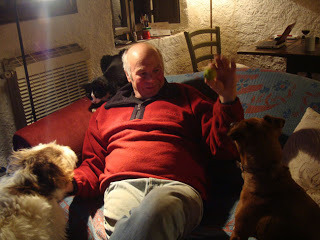
Neil is about to start another sculpture down in the marble yard, but tomorrow is the feast of San Biaggio, so nothing is open now until Monday. Typical Italy!
Published on February 02, 2012 10:02
January 30, 2012
Tuesday Poem: Norman Nicholson
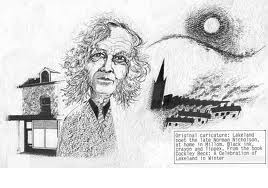
Well, the rabbit is out of the hat and in full view of the audience. I'd been keeping quiet about the subject of the new biography until everything was signed and sealed, but Melvyn Bragg mentioned it in his BBC Radio 4 programme and newsletter - so now everyone knows that I'm writing about Norman Nicholson!
So, who was Norman Nicholson? An obscure northern poet, from the small town of Millom in Cumbria, born in 1914, a protegee of T.S. Eliot and the Lake District's second most famous poet after Wordsworth. 'Poem' is NN's working manifesto.
Poem
I would make a poem
Precise as a pair of scissors, keen,
Cold and asymmetrical, the blades
Meeting like steel lovers to define
The clean shape of the image.
I would make a poem
Organic as an orchid, red
Flowers condensed from dew, with every lobe
Fitted like a female to receive
The bee's fathering head.
I would make a poem
Solid as a stone, a thing
You can take up, turn, examine and put down;
Bred of the accident of rain and river,
Yet in its build as certain as a circle,
An axiom of itself.
I was approached recently by the Trustees of the Nicholson Estate to write a Life and Work for the Norman Nicholson centenary in 2014. This isn't a commercial project, more a labour of love - I've always loved NN's poetry - he wrote about the landscape I grew up in - a working landscape, not the pretty picture postcard views sold to the tourists. His best poems are probably Wall, Sea to the West and On the Dismantling of Millom Ironworks, which is about the brutal de-industrialisation of the north of England in the second half of the twentieth century. This is an extract:
'They shovelled my childhood
On to a rubbish heap. Here my father's father,
Foreman of the back furnace, unsluiced the metal lava
To slop in fiery gutters across the foundry floor
And boil round the workmen's boots; here five generations
Toasted the bread they earned at a thousand degrees Fahrenheit
And the town thrived on its iron diet. On the same ground now
Split foundations moulder in the sea air; blizzards
Of slag-grey dust are blown through broken Main Gate uprights;
Resevoir tanks gape dry beside cracked, empty pig-beds:
And one last core of clinker, like the stump of a dead volcano,
Juts up jagged and unblastable.....
He lived all his life in the house he was born in - stubbornly defending his northernness - always a fierce enemy of Metrocentrism. When anyone referred to him as a recluse he would say drily 'They mean I haven't been seen lately in London.' People like Philip Larkin denigrated him as a 'Provincial'. He was emphatic about the truth of Robert Frost's statement 'In order to be universal, you must first be provincial'.
I've only just embarked on the initial research and will keep you posted. This will be the first time I've ever talked publicly about writing a biography, so it will be a new experience!
For more Poetry please check out the Tuesday Poets at www.tuesdaypoem.blogspot.com
Published on January 30, 2012 09:13
January 28, 2012
Author and Agent - Mitchell and Webb comedy
This little clip made me laugh a lot! I once had a talk with an agent rather like this, though it wasn't as funny.

Published on January 28, 2012 06:09
January 27, 2012
A Day in London - Flashbacks.
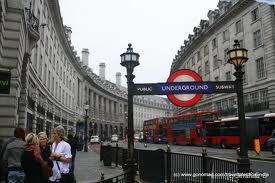 A bar off Regent Street. Rich kids in clothes that don't come from department stores; the casual clunk of Mulberry bags, the click of Sophy Lazlo heels, the over-priced economy of Dolce and Gabbana. Gyozo Dumpling soup. A blueberry, free-radical infusion. A man eating sandwiches with one black leather glove. The Nash church is locked against student protest. A Bond Street jeweller sells diamonds bigger than the Ritz to Saudi princes and unshaven oligarchs.
A bar off Regent Street. Rich kids in clothes that don't come from department stores; the casual clunk of Mulberry bags, the click of Sophy Lazlo heels, the over-priced economy of Dolce and Gabbana. Gyozo Dumpling soup. A blueberry, free-radical infusion. A man eating sandwiches with one black leather glove. The Nash church is locked against student protest. A Bond Street jeweller sells diamonds bigger than the Ritz to Saudi princes and unshaven oligarchs.Newspaper headlines signal the inevitability of Greek bankruptcy - a financial storm gathering over Davos. The red lines in the street outside the door. No Stopping. Someone selling consultancy at the next table. "Third party participancy." People on the pavement walking, walking, clutching their mobiles, bags, mineral water. A car with smoked glass windows, single numbers on the plate.
The doorman with a blue-tooth earpiece who wishes us a pleasant day. Standing in front of a Picasso with six noughts after the price. Underground, a crowded metal bullet hurtling through darkness. Another bar. Beyonce on the speaker system, Amy Winehouse - scorched throat music. Another tea, another wine. Spaghetti bolognese.
A spat of rain. The flowering of umbrellas.
This is my day.
(Extracts from my journal. Now on my way back to Italy)
Published on January 27, 2012 12:55



